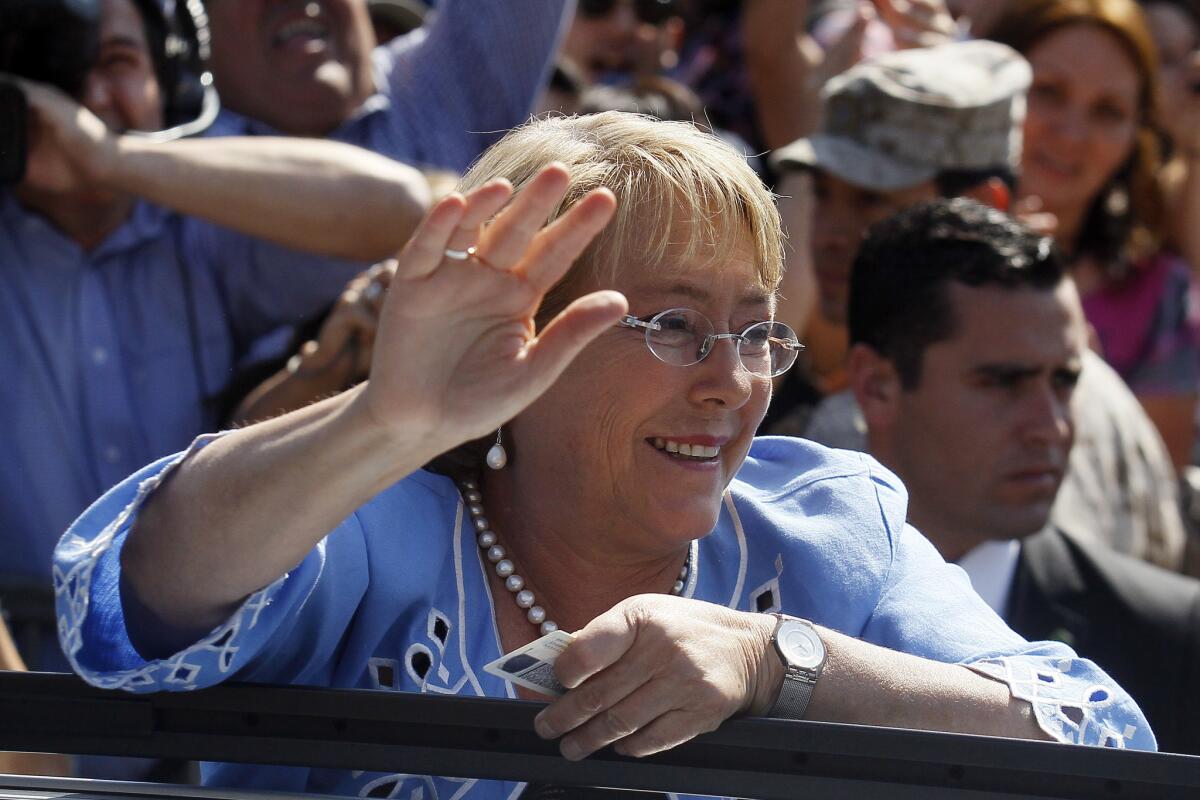Former President Michelle Bachelet wins a new term in Chile

- Share via
SANTIAGO, Chile -- Former President Michelle Bachelet was elected to a new term as Chile’s leader in a landslide victory Sunday, becoming the first woman to be reelected chief executive in the nation’s history.
With 90% of votes counted, she led her conservative opponent, former Labor Minister Evelyn Matthei, 62.3% to 37.7%.
Representing the New Majority coalition of parties, the 62-year-old pediatrician leveraged her high standing with Chileans during and after her first four-year term, which ended in 2010, to coast to victory.
Bachelet was riding high in recent polls, and to many, her victory was a foregone conclusion. Even her opponent, who served in the administration of outgoing President Sebastian Pinera, admitted in the campaign’s closing days that a victory would amount to a “miracle.”
Matthei conceded victory at 7 p.m., barely an hour after the polls closed.
“I voted for Bachelet because she was the best candidate, she did a good job the first time around, and I’m sure she will run a good government,” Osvaldo Molina, a 34-year-old computer technician, said after voting Sunday morning in the San Miguel barrio of the capital, Santiago.
Bachelet promised during the campaign to rewrite the constitution, reform the tax code and overhaul the education system. She also promised to give indigenous citizens more say. Her proposed constitutional changes would do away with an anti-terrorism law that gives authorities the power to arbitrarily detain suspects for three days.
Voters didn’t give Matthei much credit for the solid performance of the Chilean economy during the presidency of fellow Alliance party member Pinera, said Patricio Navia, a political science professor at Diego Portales University in Santiago.
“Chileans did not vote for radical reform,” Navia said. “They have high expectations that Bachelet will deliver better government services, free education for all and better pensions. They don’t care quite as much about how she will do it [but] have high expectations that she will deliver, soon.”
The election pitted against each other two former childhood friends whose fathers were air force generals on different sides of the bloody 1973 coup that overthrew leftist President Salvador Allende. Bachelet and her father, Alberto, were tortured by the junta that seized power, while Matthei’s father, Fernando, became part of the dictatorship that ruled until democracy was restored in 1990.
More than 13 million Chileans were eligible to vote, but analysts predicted a turnout of no more than half of those registered, perhaps because Bachelet was such a prohibitive favorite. Abstention was high, almost 50%, in the first round of voting Nov. 17.
In two televised debates, Matthei tried with little success to chip away at Bachelet’s near-spotless image, accusing her of responding too slowly to the 2010 earthquake that killed hundreds. It also was clear that the dictatorship’s legacy of 3,000 killed and disappeared and 40,000 detained or tortured was a factor for many voters.
“Bachelet’s proposals are much better than Matthei’s,” said Abraham Saez, a publicist who also voted in the southern San Miguel barrio. “I know our history. I’m not giving my vote to a person on the right.”
Matthei, a 60-year-old economist and mother of three, was also hindered by the fact she was her party’s third choice. She was nominated in July after two other leading Alliance candidates, Pablo Longueira and Laurence Golborne, had to bow out. Some analysts said her losing bid was designed more to position her for the next election in 2017.
Bachelet won the first round of voting last month, but with 47% of votes, she didn’t garner enough to avoid a runoff with Matthei, who then polled 25%.
Political scientist Navia said that despite the landslide victory, Bachelet’s presidency won’t be easy.
“The slowing economy will put additional pressure on Bachelet. People are expecting subsidies and more government spending, but they might end up seeing higher unemployment,” Navia said. “As normally happens when people remarry their old partners, Bachelet will not have much of a honeymoon.”
[For the record, 4:52 p.m. Dec. 15: An earlier version of this post misspelled Pablo Longueira’s and Laurence Golborne’s names as Pablo Longuiera and Lawrence Golborne.]
Special correspondents Gutierrez reported from Santiago and Kraul from Bogota, Colombia.
More to Read
Sign up for Essential California
The most important California stories and recommendations in your inbox every morning.
You may occasionally receive promotional content from the Los Angeles Times.










